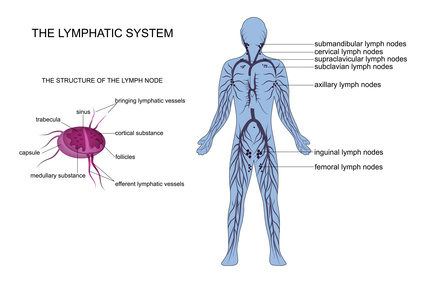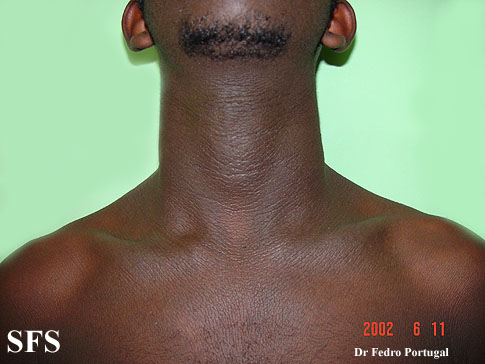Causes of Swollen Neck Lymph Nodes
The neck contains a large number of lymph nodes, known as the cervical lymph nodes and many are superficial and easily palpable (can be felt by touch). A swollen neck lymph node is not uncommon and frequently occurs in children, even when there is no disease or obvious cause present. With age, the incidence of enlarged neck lymph nodes declines except when it is due to some pathology.
The most common cause for swollen neck (cervical) lymph nodes is an infection. While most incidents of cervical lymph node enlargement is self-limiting and resolves quickly, some may persist for a longer time and may need more active management. Among this group, the supraclavicular lymph nodes are of special significance. Their enlargement may be an ominous sign since it is most often associated with malignancy and careful assessment and investigation is indicated.
Anatomy of Neck Lymph Nodes
Swollen lymph nodes of the neck may be localized, where only groups of lymph nodes in the neck are enlarged. In some cases, it may be generalized where lymph nodes in other parts of the body are also involved.

There are mainly six different groups of lymph nodes situated in the neck and according to their location they are classified as :
- Anterior cervical lymph nodes which lie in the front of the neck and are of two types, superficial and deep. They drain the internal structures of the throat as well as the tonsils and thyroid gland.
- Posterior cervical lymph nodes which are located in a line at the back of the neck, extending from the mastoid part of the temporal bone (from about the middle of the head) to the clavicle (collar bone). They normally become enlarged in the event of an upper respiratory tract infection.
- Tonsillar lymph nodes which are situated just beneath the mandible (jaw bone). They drain the tonsils and posterior part (back) of pharynx.
- Sub-mandibular lymph nodes which lie along the bottom of the mandible (jaw bone) and drain the floor of the mouth tongue, lips, and conjunctiva. They are normally enlarged due to infections of the head, neck, sinuses, ears, eyes and pharynx.
- Sub-mental lymph nodes which are located just below the chin and help to drain the teeth, lower lip, floor of the mouth, tongue and cheek. They commonly enlarge due to mononucleosis, toxoplasmosis, and dental infections such as periodontitis.
- Supraclavicular lymph nodes which are situated in the hollow just above the clavicle (collar bone).
- The right supraclavicular lymph nodes drain the lungs, mediastinum and esophagus. It is commonly enlarged due to lung cancer, gastrointestinal cancer or Hodgkin’s lymphoma.
- The left supraclavicular lymph node drains the thorax (chest) and abdomen. It may be enlarged due to thoracic or retroperitoneal cancer, breast cancer, lymphoma, or an infection. The left supraclavicular lymph node or Virchow’s node enlargement may be the first sign of stomach cancer, even before the presentation of any other symptoms.
Causes of Neck Lymph Node Swelling
Swelling of the neck lymph nodes usually arises with conditions, particularly infections, in and around the neck area. However, it is also one of the groups of lymph nodes which commonly becomes enlarged with certain systemic diseases where the problem is not isolated to the head, neck or chest region.

Infections
Infections are the most common cause of swollen neck lymph nodes whether it is a viral, bacterial or parasitic infection is an infection. Some of these infections include :
- Strep throat
- Tonsillitis
- Peritonsillar abscess
- Mumps
- Measles
- Rubella (German measles)
- Dental infections
- Ear infections
- Skin infections and infected wounds of the head and neck particularly.
- Sinusitis
- Epiglottitis
- Infectious mononucleosis
- Tuberculosis
- Sarcoidosis
- Cat scratch disease
- Toxoplasmosis
- Sexually transmitted disease (STD) such as syphilis can also produce lymph node swelling of the neck.
Cancer
Malignant tumors, particularly in the head or neck, may cause lymphadenopathy of the cervical lymph nodes. This may also indicate metastasis (cancer spread) from other parts of the body or the areas drained by the affected lymph nodes. It is important to take note of the Virchow’s node which may be an early warning sign of stomach cancer.
- Lymphoma is cancer of the lymph node and there are two forms of lymphomas – Hodgkin’s disease and non-Hodgkin’s disease.
- Leukemia is cancer of the blood forming tissues, including bone marrow and lymphatic system and may cause lymph node enlargement.
- Melanoma – a type of skin cancer.
- Cancer of the mouth, larynx, or oropharynx can cause enlargement of the draining lymph nodes in the neck.
Systemic
Systemic causes of swollen neck lymph nodes usually involve different types of autoimmune diseases and other diseases that cause an immune deficiency. This includes :
Usually the lymph node swelling is not isolated to the cervical lymph nodes and may be generalized.
Drugs and Vaccines
- Certain drugs like phenytoin and carbamazepine may cause swelling of the neck lymph nodes as a side effect. Other drugs may also be responsible.
- Vaccinations like the MMR vaccine for protection against measles, mumps, and rubella as well as the typhoid vaccine may occasionally cause lymph node swelling although this is usually temporary.
Diagnosis
The characteristics of the swollen lymph node often helps to determine the cause of the swelling. Usually, lymph node swelling due to an infection are soft, painful, and mobile, with signs of inflammation on the overlying skin. Cancerous lymph nodes are hard, fixed (not mobile) and usually not painful. Lymph nodes that seem connected to each other are called “matted” lymph nodes and may be associated with tuberculosis, sarcoidosis or malignancy.
Lymph nodes are sometimes described as “shotty” when they may be small, non-tender and have a rubbery consistency. This type of lymph node may be seen following an infection which has already resolved and does not have the typical characteristics of either an infected or a malignant lymph node.
Constitutional symptoms such as fever, night sweats, weight loss and fatigue may also give an indication as to the cause of lymph node swelling. If necessary, your doctor may consider a biopsy for further investigation in order to make a conclusive diagnosis.
References
- Cervical lymphadenopathy. Medscape
Last updated on October 10, 2018.





